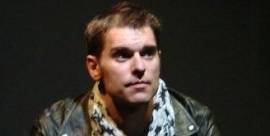When I was discussing what to write this week with my editor, I came up with this crazy notion to survey a covey of actors (that’s twelve to the untrained observer of actors in their native habitat) whom I admire about why they do this theatrical thing for free. Acting is a frustrating road to travel. You can do your best in an audition and not get cast because you are too big, too small, too old, too young, your tits are wrong, your tits are right but your gender isn’t, your hair is wrong, your accent… One friend, not included in this interview and who will not be named, was told by a director in an audition that she had done well and he should cast her, but something was just wrong so he was going a different direction … with the actor he was boning at the time.
Directors have long memories, so if the last role the director saw you in sucked, or the whole show sucked, or you said that the director’s last gig sucked and he or she read about it on Smile Politely, you’re kinda fucked. A lot of shit can crush your soul as an actor, and there are certainly easier and less self-effacing hobbies. So why do so many people in our community do this at all, let alone for free?
The actors responding to this interview have a broad range of experiences and insights. Let’s meet the cast, shall we:
*Lindsey Gates-Markel is a regular at the Station Theatre and has appeared in the recent production of Or, as well as Becky Shaw and Eurydice.
*Chris Clevidence Taber has appeared in productions at Parkland, CUTC, and the Station, most recently in this spring’s production of Sons of the Prophet.
*Stephanie Swearingen, another player in the Station’s recent production of Or, also had key roles in Light at the Piazza, My Antonia, and Prairie Fire’s Damn Yankees.
*Corbin Knight-Dixon has worked in multiple community venues, including his turn as the titular character in the Station’s spring production of the rock musical Bloody Bloody Andrew Jackson.
*Mikel Matthews is mostly known for directing (and will do so with this summer’s Evil Dead: The Musical at the Station), but he has done some lovely acting as well, including the Station’s production of the comedy The 39 Steps.
*Ellen Fred has appeared in productions at Parkland, the Station and Krannert Center, including roles in Dead Man’s Cell Phone, Hairspray, Dracula, and Spring Awakening.
*Joel Higgins is new to the C-U theatre scene and had an impressive debut performance in the previously mentioned Sons of the Prophet.
*Rob Zaleski is a former resident of C-U currently residing in Austin, Texas. He was a go-to romantic lead in the area, appearing at Parkland and the Station in Angels in America Part 1: Millennium Approaches, Laughing Stock, Dead Man’s Cell Phone, The Little Dog Laughed, The 39 Steps, and Gruesome Playground Injuries.
*When not costuming, Malia Andrus is a consistent face in the local theatre scene and has performed in all of the previously mentioned venues with diverse and principle roles in Rent, The Producers, How I Learned to Drive, Independence, and most recently, Parkland’s The Mystery of Edwin Drood.
*Katie Baldwin, a writer for Smile Politely, has appeared at both the Station and Parkland in multiple productions, including Parkland’s Flight of the Lawn Chair Man, the Station’s productions of The Little Dog Laughed, and this season’s original adaptation of Hamlet.
*Lincoln Machula is also a veteran of our area theatres with roles in Harvey, Nuncrackers, and You Can’t Take it with You at Parkland, and roles in Absurd Person Singular, Cat on a Hot Tin Roof, and the first production of the summer season at the Station, Superior Donuts.
*Lincoln’s co-star in Donuts, William Anthony Sebastian Rose II has been a fixture on both the Parkland and CUTC stages and is making his debut with the Station this summer. His roles include Laughing Stock, Dead Man’s Cell Phone, Rent, Once on This Island, and now Franco in Superior Donuts.
I gave this eclectic and slightly incestuous troupe of actors six questions to answer via Facebook or email. In a perfect world this would have been done as a themed dinner party, sort of like the Algonquin Round Table, or Oprah’s Book Club … and at her house … with Steadman serving while Gail accompanied on the cello … and lots of expensive linens and candelabras. But actors with day jobs haven’t the time for linens and china, so this is the virtual dinner party come to life. Enjoy!
1. Why do you act? What are the personal rewards of doing an acting gig?
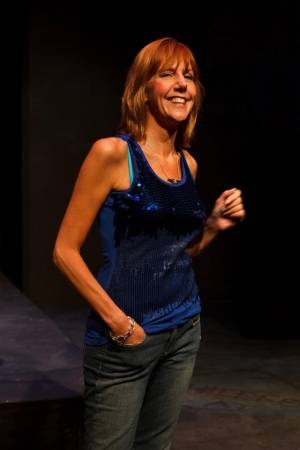 Chris Taber (pictured, right): “Why do you act?” Hard question, probably because I can’t imagine NOT acting. If I go too long without it, I get off-balance. I feel jittery and agitated. Sometimes I don’t know why I’m feeling that way, or I blame it on my job or my kids or my husband; then I remember that I haven’t been in a show for a while!
Chris Taber (pictured, right): “Why do you act?” Hard question, probably because I can’t imagine NOT acting. If I go too long without it, I get off-balance. I feel jittery and agitated. Sometimes I don’t know why I’m feeling that way, or I blame it on my job or my kids or my husband; then I remember that I haven’t been in a show for a while!
I teach Drama to middle-schoolers, so one would think I’d get my theatre “fix” in the classroom, but being in a show is a completely different animal. I love the bond I develop with my castmates, and director; we become a family, if only for a little while. I love the creative process of analyzing a script, talking through scenes and motivations with other actors and the director, finding a bit of me in every role I play. I love the actual performances as well. The way each performance can be different, depending on the audience, the other actors, the feel of the room, my mood, the weather. It’s a constantly changing dynamic, and it’s exhilarating!
I remember first feeling that this acting thing might be for me. I was in junior high, tall and skinny and awkward, with braces and acne. It was not a time of feeling self-confident, that’s for sure! My English class did some kind of a Christmas play for the entire student body (at least it felt that way, it may have only been a couple of classes!) in which I played a “Scrooge” character. It was a comedy, and when I heard the appreciative laughs during my performance and the applause at the end I was hooked! I actually felt good about something! I haven’t stopped acting since.
Corbin Knight-Dixon: Performing is my self-care. Nothing takes a load off your back like throwing yourself into a character and stepping outside of your own worries for 165 minutes. We don’t always get to do that… When I’m singing, I have permission to clear my head of that “upcoming project” or that “one thing I didn’t finish.” When I’m portraying a character, I have permission to shut off Corbin Knight-Dixon, the sexuality educator. I can be Marc Cohen, or Andrew Jackson, or Immigrant #2. Performances allow you to lose yourself. I revel in those moments I can feel lost.
Stephanie Swearingen: Theatre is the one place I feel comfortable. I love the process, creating a character, working with other actors and directors to create a different world. For me, the personal reward is the chance to escape my own mundane life and be someone else for a few hours a night. I act because it’s a safe environment [in which] to be creative. There are boundaries to build within; the words provide a framework, but it’s what you do as an actor that brings it to life. It’s like playing classical music. The performance changes every time even though the notes all stay the same. That is the kind of creative environment I thrive in.
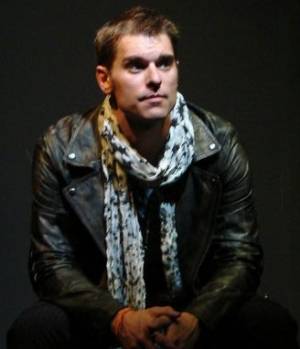 Rob Zaleski (pictured, left): Though part of why I act is slightly self-serving (I love the thrill of being on stage), the main reason is because I enjoy inciting emotion in others. Whether that be laughter, tears, or simply a couple hours of highly entertaining theatre, I love the challenge of drawing in an audience and making them believe what is happening in front of them. To hear that you honestly and truly reached someone on a visceral level is something that instills pride and a sense of accomplishment. When I did Gruesome Playground Injuries, and people told me that they broke down and cried during the performance, that meant that we connected in that moment. Also, to hear full-throttle, belly-laughter from an audience (like there were during some scenes in Laughing Stock at Parkland College Theatre) is downright exciting. There are few things more satisfying than that.
Rob Zaleski (pictured, left): Though part of why I act is slightly self-serving (I love the thrill of being on stage), the main reason is because I enjoy inciting emotion in others. Whether that be laughter, tears, or simply a couple hours of highly entertaining theatre, I love the challenge of drawing in an audience and making them believe what is happening in front of them. To hear that you honestly and truly reached someone on a visceral level is something that instills pride and a sense of accomplishment. When I did Gruesome Playground Injuries, and people told me that they broke down and cried during the performance, that meant that we connected in that moment. Also, to hear full-throttle, belly-laughter from an audience (like there were during some scenes in Laughing Stock at Parkland College Theatre) is downright exciting. There are few things more satisfying than that.
Lindsey Gates-Markel: At the risk of being a walking cliché, I’ve just always done it. I was a performer as a kid and grew into more of a mimic as I got older. I get a deep, abiding pleasure from pretending to be someone else and getting to tell a story that way.
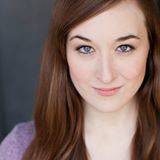 Ellen Fred (pictured, right): When I was in fifth grade, I was chosen to partake in an organization for students who were excelling in their classes while maintaining a positive attitude about education. During this program, we were instructed to interview patients at Clark Lindsey Retirement Village in Urbana. After that, we were to create plays that we constructed from the personal stories of our elderly partner. This was the first time I ever even considered acting as a hobby, let alone a career. To this day, I attribute my passion for performing to the woman in charge of this program, Jennifer Goran. This lovely person ran a youth summer theatre camp that I partook in every year until she retired in the summer between eighth grade and freshman year. With the possible exception of my parents, I do not think there has ever been someone who so strongly encouraged me to follow my dreams. Not only did she support all of her students, but she inspired us to create and to continue to do so for the rest of our lives.
Ellen Fred (pictured, right): When I was in fifth grade, I was chosen to partake in an organization for students who were excelling in their classes while maintaining a positive attitude about education. During this program, we were instructed to interview patients at Clark Lindsey Retirement Village in Urbana. After that, we were to create plays that we constructed from the personal stories of our elderly partner. This was the first time I ever even considered acting as a hobby, let alone a career. To this day, I attribute my passion for performing to the woman in charge of this program, Jennifer Goran. This lovely person ran a youth summer theatre camp that I partook in every year until she retired in the summer between eighth grade and freshman year. With the possible exception of my parents, I do not think there has ever been someone who so strongly encouraged me to follow my dreams. Not only did she support all of her students, but she inspired us to create and to continue to do so for the rest of our lives.
I act to expose the world for what it really is — both the good and the bad aspects. I used to use it as a way to get away from myself. However, the older I get the more I realize that this is actually a terrible habit. Rather than leaving myself behind, I have learned to bring myself to each character I play and I have found that my work has become much more effective as a result. By getting to know and accept myself better, I have grown to be a much more loving and intelligent human being. I think that performing gives me a chance to shed this knowledge that I have gained on willing people: audience members. If, after seeing a show of mine, one person leaves with a different outlook on life, leaves inspired, leaves changed, I have done my job. As cheesy as it sounds, that is truly the only reward I am in search of: change.
William Anthony Sebastian Rose II (pictured below, left): For me, acting allows me to tap into parts of my personality that I may not get the opportunity to showcase on a regular basis. I 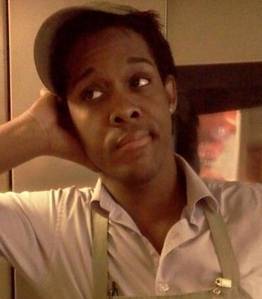 am so interested in how people interact with each other and the reasons why they interact the way they do. Why does someone say “this” when they are thinking “that” in front of one person, but say something different to another? The thoughts that we all hide and the reasons behind those thoughts and actions fascinate me! It allows me to better understand others, and I honestly think that it gives me an edge with people by allowing me to see things from their perspective and giving me the opportunity to get closer to them.
am so interested in how people interact with each other and the reasons why they interact the way they do. Why does someone say “this” when they are thinking “that” in front of one person, but say something different to another? The thoughts that we all hide and the reasons behind those thoughts and actions fascinate me! It allows me to better understand others, and I honestly think that it gives me an edge with people by allowing me to see things from their perspective and giving me the opportunity to get closer to them.
The first time I really knew that I wanted to be an actor was my sophomore year in high school. The teacher was Sue Aldridge and she gave me my first role in Arsenic and Old Lace. After the show, I remember walking out and seeing her standing next to my parents, and they all had this glow about them. Pride. My parents were so thrilled, and Mrs. Aldridge was so joyful, and the audience was elated, and I knew that this is what I wanted to do. Beyond myself, it was my parents and Mrs. Aldridge who gave me the opportunity and encouraged the growth. I love what I do.
Lincoln Machula: When I was in sixth grade, I stood in front of the class and acted out “Ledge Psychology” from Bob Newhart’s album The Button-Down Mind Strikes Back! I got some laughs. That’s all it took. Every show (almost) gives an opportunity to learn things I never would have found on my own. Dramaturgy is fun! There’s no people like show people. You gotta love ’em.
Malia Andrus: Both of my modes in theatre (costume design and acting) are about telling truths on the stage. I believe that the arts are how we define what our experience of humanity is, and it’s a critical piece of being a human. I love exploring those human experiences in theatre, whether that’s through being committed to the truth in a compelling scene, shining a light on a character’s internal dialogue, or highlighting the themes or plot of a piece through costuming accurately to the story and character. I appreciate being the conduit for the humor, the shocking, the heartbreaking, and the warmth that is humanity.
2. What are the challenges of working a real job and acting on the side? How do you manage the time? What is most important in this balancing act between pursing your craft and keeping your day job?
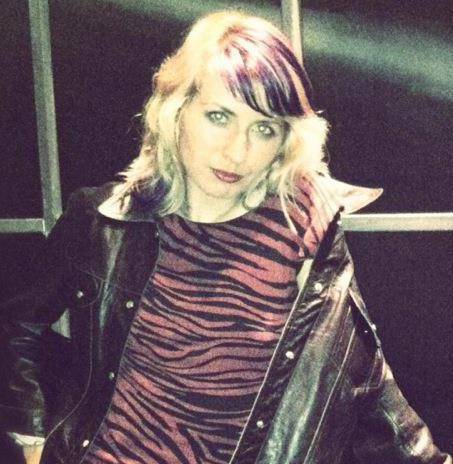 Malia Andrus (pictured, right): This is a big deal that I think a lot of non-performing people don’t realize. It can be really tough when you’ve been performing a show with a long run-time (say, RENT) until 11 p.m. and then need to “come down” from the performance high and get some sleep before being up for your paying job. I have the weirdest day job of any of the theatre folks I know: I’m a senior engineer/data scientist for an engineering consulting firm. I had to be very up front with them that I do a lot of performing and costume design and wouldn’t typically be able to travel or to work evenings if deadlines appeared. I also worked out a deal to only work four days a week. This has been crucial because it gives me a day to do things that most people take for granted being able to do in the evenings when I’m rehearsing or performing. Like laundry. Or buying toilet paper. I know that I’ve sacrificed some upward mobility and salary in my job to be able to perform and design and keep my sanity. But it’s absolutely worth it. I guess the other answer is that I’ve become a black-belt time manager. You do what you need to [in order] to survive and get your creative fix.
Malia Andrus (pictured, right): This is a big deal that I think a lot of non-performing people don’t realize. It can be really tough when you’ve been performing a show with a long run-time (say, RENT) until 11 p.m. and then need to “come down” from the performance high and get some sleep before being up for your paying job. I have the weirdest day job of any of the theatre folks I know: I’m a senior engineer/data scientist for an engineering consulting firm. I had to be very up front with them that I do a lot of performing and costume design and wouldn’t typically be able to travel or to work evenings if deadlines appeared. I also worked out a deal to only work four days a week. This has been crucial because it gives me a day to do things that most people take for granted being able to do in the evenings when I’m rehearsing or performing. Like laundry. Or buying toilet paper. I know that I’ve sacrificed some upward mobility and salary in my job to be able to perform and design and keep my sanity. But it’s absolutely worth it. I guess the other answer is that I’ve become a black-belt time manager. You do what you need to [in order] to survive and get your creative fix.
Stephanie Swearingen: Managing time for me is more about finding sleep than working. Because I typically have a 45-minute drive to and from rehearsal, I record my lines and run lines while in the car. Sleep and meals that aren’t from a fast food place are the two main things I feel I am giving up. My everyday job is very practical and analytical. I work with numbers all day. I use my personal days and vacation days to go to auditions or catch up on sleep I missed during a show’s run.
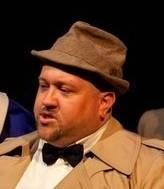 Mikel Matthews (pictured, left): Acting is actually easier for me than when I’m directing. My real job as a high school English teacher is easier to keep up with when I have a small-to-medium role in something. During the down time, I’m able to grade and work on planning. If I’m in a major role (or directing), I have to be very careful as to how I use my prep periods and the time between the high school shows and whatever I’m doing in town. My sleep suffers a lot. We work best when we’re exhausted, right?
Mikel Matthews (pictured, left): Acting is actually easier for me than when I’m directing. My real job as a high school English teacher is easier to keep up with when I have a small-to-medium role in something. During the down time, I’m able to grade and work on planning. If I’m in a major role (or directing), I have to be very careful as to how I use my prep periods and the time between the high school shows and whatever I’m doing in town. My sleep suffers a lot. We work best when we’re exhausted, right?
Lincoln Machula: I’m a lucky dog, I don’t have a problem with that.
Rob Zaleski: I’ve opted for the comfort of a steady paycheck to pursuing something I truly love. This is tough, and offers two challenges: One is time constraints, and the other is knowing that you’d rather be doing the other thing you’re more interested in. I hate auditioning, but I love acting. The former is a necessary evil of the latter, and one reason why I never pursued acting completely. Working a full-time job while acting, it can be tough to fully inhabit a character when you’re rehearsing on your lines during lunch breaks. It’s difficult to focus when rehearsals are running late if you’re considering the fact that you have to get up early and do that other thing that pays the bills. Though they conflict, you somehow make it work so that you can take part in such a beautiful and wonderful thing as theatre.
Chris Taber: There are many challenges of working a “real” job and acting on the side! I often find myself thinking of the role I’m portraying, or trying to memorize lines while in the middle of teaching a lesson during the day. Oops. But it’s also been helpful for my students to know that I love theatre sooo much that I do it for free, for fun! As challenging as it is to balance work and acting, I find it much more difficult to balance my roles as mother and wife with my acting. I try not to do one gig right after another. I don’t want my family to get resentful of the world of theatre, my children in particular. I want them to see their mother filling herself up with something she’s passionate about, so that they will do that themselves in their lives. I also feel I’m a better mother and partner if I get my theatre fix.
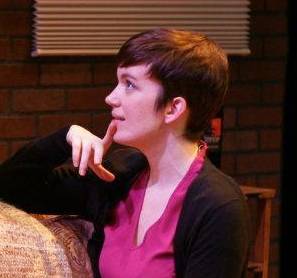 Lindsey Gates-Markel (pictured, right): I’m lucky to have a family and a partner who are beyond supportive. When the rehearsal period for a show begins, so does this mostly-unspoken contract that says that mom’s just not gonna be around a lot for six weeks or so. It’s unfair, but it’s got an end date. But the trade-off is part of the culture in which my husband and I have brought up our son: one in which people work together and spark ideas and make art as a community. We take him to see lots of theatre and experience as much of that community as we can, and it’s important to me that he see his mom as an active participant.
Lindsey Gates-Markel (pictured, right): I’m lucky to have a family and a partner who are beyond supportive. When the rehearsal period for a show begins, so does this mostly-unspoken contract that says that mom’s just not gonna be around a lot for six weeks or so. It’s unfair, but it’s got an end date. But the trade-off is part of the culture in which my husband and I have brought up our son: one in which people work together and spark ideas and make art as a community. We take him to see lots of theatre and experience as much of that community as we can, and it’s important to me that he see his mom as an active participant.
3. What is your favorite role/show and why was it your personal best?
Chris Taber: I choose a role with several criteria in mind. It has to be a great script. I don’t just look at the part I want to play, but the overall story.
This past season my favorite role was probably L’il Bit in Paula Vogel’s How I Learned to Drive. It had all my criteria! I was very worried I wasn’t up to the challenge, and that, frankly, was why I took the role. It was a role about an adult woman telling the audience, mostly through flashbacks, about how her uncle sexually abused her as a child. I wanted to give this character, and others like her, a voice, but it needed to be real, not histrionic. There were a lot of talks with the director, and searching inside of myself for a connection or at least an emotion that I could share with L’il Bit. In the end, it was such a cleansing time for me, both the rehearsal process and each night’s performance. Acting allows me to feel those “hidden,” perhaps inappropriate-in-polite-society emotions that I don’t let surface day to day. Life is too busy: Work, family, bills, schedules get in the way. But onstage, all that falls away and it’s just raw emotion. An added plus is having great actors up there with you, taking your rawness and sending back their own. It’s such a high to experience! Then you can walk away, purged, and go back to the daily grind.
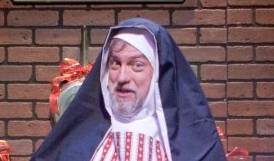 Lincoln Machula (pictured, left): I’ve played some men I admire and wish I could emulate: Det. Sgt. Rob Debree (Laramie Project), Dr. Lyman Hall (1776), Otto Frank (Diary of Anne Frank). And I’ve played some Big Silly-Heads, and some real sick fucks (Solyony in Three Sisters was like a disease I suffered from for a couple months). But Elwood P. Dowd in Harvey is the one I love the most, and I hope I did him justice.
Lincoln Machula (pictured, left): I’ve played some men I admire and wish I could emulate: Det. Sgt. Rob Debree (Laramie Project), Dr. Lyman Hall (1776), Otto Frank (Diary of Anne Frank). And I’ve played some Big Silly-Heads, and some real sick fucks (Solyony in Three Sisters was like a disease I suffered from for a couple months). But Elwood P. Dowd in Harvey is the one I love the most, and I hope I did him justice.
Ellen Fred: While it is not necessarily my favorite show overall, the most fun I have ever had performing was as Penny Pingleton in Hairspray at the Station Theatre. I was going through a huge, emotional roller coaster of a time, changing schools and majors. For the first time in years, though, I allowed myself to let go of the pressure that grew around the idea of “performing,” this need to always be perfect. I had fun! This is why I fell in love with it in camp years and years ago. Somewhere along the line, I got way too serious. The energy from the amazingly talented cast and crew, along with the pure joy from the music and plot of this show, made it impossible to stress myself out. After the show closed, I promptly changed my major back to acting. I could not give up on my dream because of a rough patch. There is nothing in the world that can replicate the high I feel on stage.
Malia Andrus: I don’t necessarily have a favorite, but from time to time there are shows that are really landmarks in my life. For me, Into the Woods with Illini Union Board (2006), and RENT and How I Learned to Drive at the Station (2012) have been shows like that for me.
Woods and RENT were both shows that have material that I really connect with, and really talk about what life is and how experiences can shape you. They are about love and friendship and the sacrifices you make and how you deal with the consequences of your actions. And they both had fantastic casts that were really bonded and creative teams that were dedicated to the messages of the show and the truths of the characters.
How I Learned to Drive was unexpectedly intense and fulfilling. Again, a cast that really worked together and material that treats a really difficult subject (pedophilia) with balance and realism. I particularly enjoyed exploring the morally gray area from the perspective of multiple characters and the chance to be both funny and devastating in the same show. And it was really nice to return to straight plays for a while.
Rob Zaleski: I can honestly say that playing Alex in The Little Dog Laughed was such an experience for me in many respects. I lost 25 pounds to play the role, it was my first (and thus far only) nude scene on stage or in film, and it was a very emotionally complex character, such that I had never explored. It took me a while to find the character of Alex, and I really wanted to avoid stereotyping and using clichés for the role. I was supremely proud of the final product. The combination of cast and crew, as well as the success of the run, has made it a show I’ll never forget doing.
Stephanie Swearingen: Antonia in My Antonia was a changing point for me as an actor. I had almost strictly done musicals up unto that point. Antonia was a huge acting challenge. The first major obstacle was keeping up an accent for 2 1/2 hours. Also, playing a character through so much of her life is difficult because you have to go through a lifetime’s ups and down in a short span of time. I was proud of the fact that I held my own without counting on a song and dance to get me through. The role required that I carry a lot of the show and with as little practical training as I have, it was a huge challenge. I proved I could act.
4. What do you want from a director?
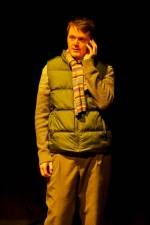 Joel Higgins (pictured, left): I want a director who pushes me. I think it’s pretty easy as an actor to drift into this comfort zone. And with most directors that’s all they seem to want: what you’re comfortable with. The directors I really cherish, though, are the ones who watch you perform a scene and then say, “Alright. That was decent. Now let’s change everything about it.” Those people stick with you. And the performances you give for them are always memorable, unique, and linger long past when the curtain falls.
Joel Higgins (pictured, left): I want a director who pushes me. I think it’s pretty easy as an actor to drift into this comfort zone. And with most directors that’s all they seem to want: what you’re comfortable with. The directors I really cherish, though, are the ones who watch you perform a scene and then say, “Alright. That was decent. Now let’s change everything about it.” Those people stick with you. And the performances you give for them are always memorable, unique, and linger long past when the curtain falls.
Rob Zaleski: Patience and respect. Patience in finding a character, shaping it, and bringing it to life. Respect in terms of time commitments and expectations when doing something like this on the side, as a completely voluntary and unpaid past time. In return, I offer commitment to the show and the role, and a promise that I will do my damnedest to provide a performance people will enjoy. I’ve been lucky to have worked with some great directors who exhibit both of these characteristics. I’d work with most of them again in a heartbeat.
Stephanie Swearingen: Support, sometimes a direction where to go, and the freedom to explore. I love having directors who give me an idea and are willing to let me play it out. As I’m kind of klutzy and I tend to wander around, I really appreciate a director who sometimes is willing to a give me a road map, but let me play within those lines. Sometimes, just sitting after rehearsal and talking philosophically about the emotional journey of the characters is a great way of working without focusing on the words or individual character.
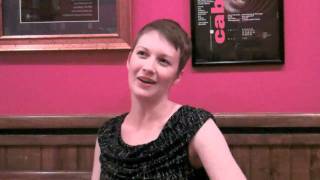 Katie Baldwin (pictured, right): I want to trust a director and be trusted. If someone “hires” me for the job, I want him or her to trust the decision. I want to be challenged to do something I’ve never done before, emotionally, vocally, or physically. I want helpful honesty, not blind praise. I want collaboration, not dictation.
Katie Baldwin (pictured, right): I want to trust a director and be trusted. If someone “hires” me for the job, I want him or her to trust the decision. I want to be challenged to do something I’ve never done before, emotionally, vocally, or physically. I want helpful honesty, not blind praise. I want collaboration, not dictation.
Lincoln Machula: Professionalism, competence, intelligence, wit, humor, humility, grace, wisdom, creativity, a clear vision, and an ability to articulate it concisely.
William Anthony Sebastian Rose II: When it comes to a director what I really need is an adult. Someone who thinks about the script and looks at the entirety of it rather than just what I’m looking at. One character versus the “frame” of the piece. The director sees something that I can’t and he/she understands moments more so than myself, and I enjoy that extra perspective.
5. What do you want from an audience? How do they get you going?
Joel Higgins: It always depends on the show for me. I mean, if you’re in a comedy, you obviously want laughs and tears in a drama. But I guess the one universal reaction I look for is impact. To me, there’s no point in doing a show unless I can be relatively sure the audience will remember it, be changed by it, or apply the play’s lessons to their own experience. You can never really know which shows will hit an audience like that. But the challenge is part of what still makes theater relevant, worthwhile, and a joy to be a part of.
Lincoln Machula: I just want them to show up. We can take it from there.
Lindsey Gates-Markel: I’m bratty about audiences. When I’m onstage, I want them leaning forward, rapt, hardly able to breathe. I want 75 Rolly Turners. [Editor’s note: Rolly Turner is a beloved audience fixture of the C-U theatre scene, a gentle soul who has bathed local actors in attention and praise for years.] Of course, they can’t all be Rollys, so I try to turn whatever energy I get into motivation. If they’re into it, that’s easy to use; if they’re not, I flip them the bird backstage and try harder, man. The punchline is that quiet, sedate audiences are, more often than not, silent because they’re concentrating, or because they just don’t have anyone leading the laughter, so I often work myself into a frenzy for no good reason. It’s my embarrassing tragic flaw.
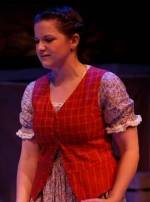 Stephanie Swearingen (pictured, left): I love having an audience that is responsive. Hating a show or loving it, any kind of response is better than an audience with no reaction at all. It’s encouraging to know that an audience likes what you’re doing, so you tend to go a little bigger, hoping to get them to respond again. It pumps your adrenaline more, and adrenaline makes me focus more.
Stephanie Swearingen (pictured, left): I love having an audience that is responsive. Hating a show or loving it, any kind of response is better than an audience with no reaction at all. It’s encouraging to know that an audience likes what you’re doing, so you tend to go a little bigger, hoping to get them to respond again. It pumps your adrenaline more, and adrenaline makes me focus more.
Rob Zaleski: Undivided attention. I’ve seen phone lights in the audience. I’ve heard people chatting and whispering during performances. Quite a bit of work and emotional input goes into making these shows come to life, all in the actors’ quote-unquote spare time. Distractions pull focus, and can remove actors from the moment they’re trying to create for the audience. It can also distract other audience members, like dominos all falling away from the moment. The least someone can do is give his or her full attention. I mean, in most circumstances, you’ve paid for a ticket — so why not enjoy it? When people do, they’re almost always in for a treat. When you’re sharing those moments with the actors and your fellow patrons, there’s something magical happening.
6. How do you balance acting and a personal life?
Katie Baldwin: Acting IS my personal life.
Malia Andrus: Ha! Theatre IS my personal life!
Mikel Matthews: Theatre really becomes your personal life. The vast majority of the people I hang out with are performers of one kind or another. In a show, you often form a small family that works together intensely for a short period of time and then breaks apart. That kind of work with people leads to very strong bonds. Even when we don’t work together for awhile, there are people I’m always happy to see and catch up with.
Stephanie Swearingen: I don’t have much of a personal life. I am friends with most of the people I act on stage with, so it kind of becomes my social life for a period. Because I do travel to get to the theater, I have never done shows back to back, which helps. Acting is what I enjoy doing, so giving up personal time isn’t an issue.
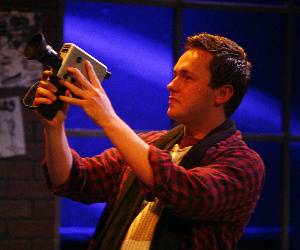 Corbin Knight-Dixon (pictured, right): You have to be okay with taking a step back for a second… That may mean stepping back and not doing that one show you’ve wanted to do, but it is absolutely needed. Check in with yourself, your family, your friends, your work. Take a breather and make sure you are still doing all the things you love to do, not just “the next thing.”
Corbin Knight-Dixon (pictured, right): You have to be okay with taking a step back for a second… That may mean stepping back and not doing that one show you’ve wanted to do, but it is absolutely needed. Check in with yourself, your family, your friends, your work. Take a breather and make sure you are still doing all the things you love to do, not just “the next thing.”
Lincoln Machula: Better to ask how I could live without some kind of creative outlet. Then I would be an out-of-balance, hopeless mess. Again. Or more so.








